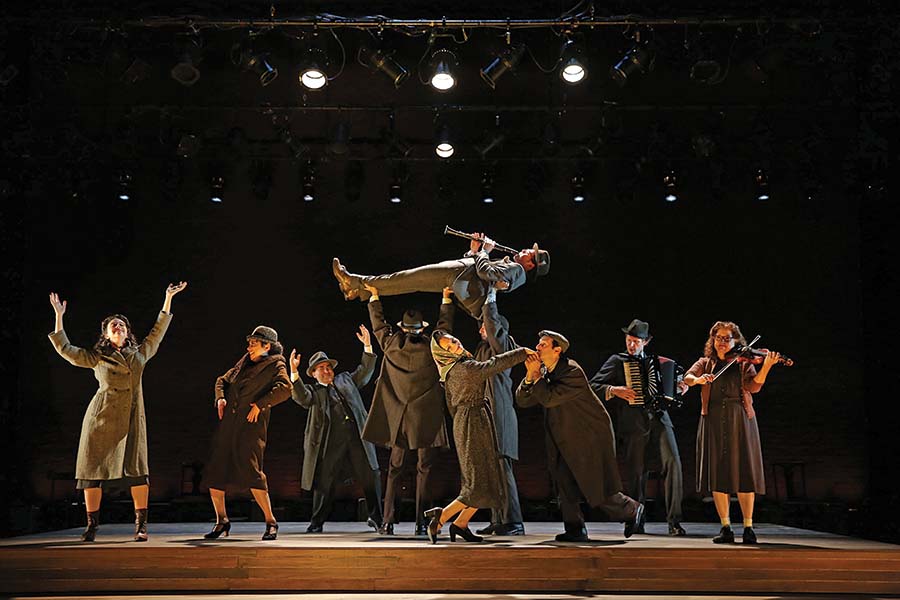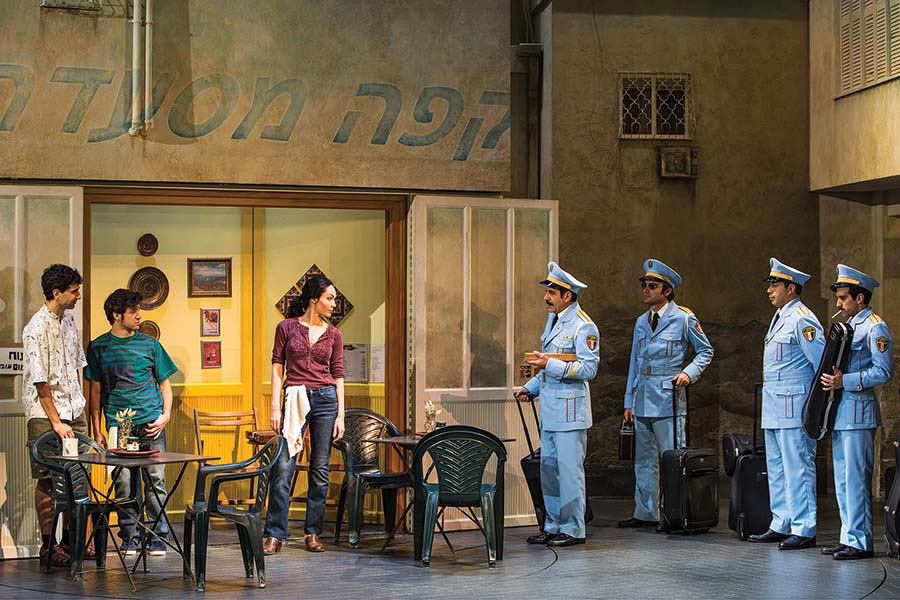At a time when many marginalized groups in the U.S. face intensified violence or discrimination—Latinx communities, immigrants from Muslim-majority countries, LGBTQ+ folks, disabled people—another group with a long history of persecution feels the threat from an administration that has winked at white supremacists and neo-Nazis: Jewish Americans. In the theatre, while many historically marginalized groups have made strides in terms of representation on U.S. stages, shows with Jewish themes seem to have had a fresh urgency and relevance in recent years.
These aren’t your bubbe’s folk tales: With new works like The Band’s Visit, David Yazbek and Itamar Moses’s hit musical, currently on Broadway; Paula Vogel’s Indecent, receiving its first post-New York City staging at the Guthrie Theater in Minneapolis (Feb. 17-March 24); and Steven Levenson’s If I Forget, now at GableStage in Coral Gables, Fla. (Feb. 3-March 4), new kinds of Jewish characters are taking center stage, and they have questions. As Jewish studies scholar Ron Wolfson muses in his book Relational Judaism, “Is there anything more common to Jewish conversation than the asking of questions?” So the natural question, with these plays interrogating Jewish identity on our nation’s stages, is why now?
It goes without saying that plays by Jewish authors and interpreters aren’t scarce at resident theatres, and that many U.S. theatre organizations identify as Jewish companies. There are several just in NYC, where Jewish immigrants first became a mainstay of the theatre industry through vaudeville and the Yiddish theatre: Among today’s New York troupes are National Yiddish Theatre Folksbiene, which calls itself the world’s longest continuously running Yiddish theatre company and produces works in that language and English, and New Yiddish Rep, which specializes in Yiddish versions of classic plays (Beckett, Miller), and in 2016 and 2017 presented a popular staging of God of Vengeance, the 1906 Sholem Asch play at the heart of Indecent, as a lead-up to the Broadway opening of Vogel’s piece.
But though representation of Jewish people on U.S. stages is hardly an anomaly, the context has changed. The latest installment of the Anti-Defamation League’s annual Audit of Anti-Semitic Incidents found that occurrences of violence and discrimination against Jewish Americans “surged more than one-third in 2016 and jumped 86 percent in the first quarter of 2017. There was a massive increase in the amount of harassment of American Jews, particularly since November 2016, and a doubling in the amount of anti-Semitic bullying and vandalism at non-denominational K-12 grade schools.”
The report was published before last August, when white supremacists marched through Charlottesville, Va., their arms extended in a Nazi salute as they chanted, “Jews will not replace us.” Foreign policy decisions, like the Trump Administration’s controversial move to recognize Jerusalem as Israel’s capital for the first time since that nation was established in 1947, also influence conversations around Jewishness, including the perennial question of whether criticism of Israel is equivalent to anti-Semitism. As those who spoke with me for this story mentioned, new and classic plays involving Jewish characters or invoking Israel or the Holocaust have taken on new meaning.

Paula Vogel, whose father was Jewish, says she first decided to write Indecent, part of which depicts a theatre troupe during the Holocaust, when she realized that young people today may never meet a survivor. Those young people, she explains, represent “a generation that is now growing up that doesn’t have that direct access to memory.” Yet over the course of the show’s mountings so far, beginning in 2015 in a co-production at Connecticut’s Yale Repertory Theatre and California’s La Jolla Playhouse and followed by a 2016 Off-Broadway run prior to its Main Stem bow last year, she has seen audiences’ relationship to the piece change.
“As every day goes by into the Trump administration, the parallels—which seemed at first perhaps a little pat, a little convenient—between the Weimar Republic and what’s happening to our democracy don’t seem as metaphorical anymore,” Vogel says. “The rise in hate speech, the white nationalism that we’re witnessing now, is something no one is ignoring.” These developments mean the play affects younger theatregoers more than she anticipated, in particular “how much it resonates with current first-generation Americans, who may be Latino/Latina, Asian—in other words, audiences who really are the first generation to be called American.”
Identity was at the forefront of Steven Levenson’s mind when he penned If I Forget, whose central character gets into hot water for writing a book arguing that Jewish Americans should move past the Holocaust. Levenson said the play, which premiered Off-Broadway in a staging from Roundabout Theatre Company in early 2017, shortly after President Trump’s inauguration, had been “about questioning what it means to be Jewish at the turn of the century, and now, in this new century, about the traumas of the 20th century, the lingering effects that they have on us.”
Levenson, who grew up in a Jewish family, notes the way U.S. Jews went from outsiders to the establishment over the course of a century, with many Jews finding themselves in a comfortable place at the beginning of the new millennium, when If I Forget takes place.
“It was difficult for Jews, obviously, in the 20th century in the United States, but by the end of the century, the question of whether Jews had assimilated was largely settled,” Levenson says. “Jews were in the most prominent positions of power, were an influence in the media and government. A lot of Jewish literature in the 20th century was so much about assimilation, so much about ‘Do Jews belong in this society?’” So part of his inspiration, he says, was the question, “‘What’s next?’ Jews had become an integrated part of this society, and really a part of the power structure in a lot of ways.”
While his play was essentially complete before the 2016 election, Levenson concedes that the aftermath has altered how he views it. “What the election ripped open was the precariousness of that situation,” he says. “Being Jewish was being an Other. In the year 2000, when the play takes place, it’s easier for the characters to feel like white people.” That feeling of safety comes through in Michael, the work’s main character. Recounting Jewish history in the U.S., Michael says: “Look at us now. Now the whole world eats bagels. They watch ‘Seinfeld’ in Topeka. We even have our own country, with our own atom bombs and everything, Star of David gunships. We’re white people now. We’re respectable. We’re nothing. Nothing at all.” That speech sounded very different after the election, Levenson says: “I felt like Michael had been proven wrong.”
If U.S.-Israel relations are a recurring sore point of conversation among the family at the center of If I Forget, The Band’s Visit presents a vision of the Middle East virtually free of conflict. The musical, based on the 2007 Israeli film of the same name, about a group of Egyptian musicians who find themselves stranded in a small village in Israel, is about overcoming and even celebrating cultural differences. Indeed, in the piece’s world, religious differences barely register. Book writer Itamar Moses, the son of Israeli immigrants, recalls talking with the cast about the characters’ religious affiliation; ultimately, he said, that aspect of their individual stories played only a minor role. “We had a conversation about how many of them are Muslim, Christian,” he says. “It was really about treating each of them as complex, totally mundane humans.”
Composer/lyricist David Yazbek, whose father is Lebanese-American and whose mother is Jewish, posits that the way the show looks past difference is one reason why it’s resonating right now. “Human beings all travel around their lives in separate vehicles,” he says. “What you’re longing for is some deep connection. The deepest level is longing for connection. In a climate like this, that disconnection becomes more painful or alienating.”

As the more idyllic Israel in The Band’s Visit offers audiences something of an escape from the troubled reality of the Middle East, real-life tension still informs the experience of theatre workers and theatregoers.
“I think anti-Semitism is fueled by all of these political events, so depending on where productions are located, they might see their reception affected more or less by local sentiments,” suggests theatre and performance scholar Jill Dolan, author of the 2017 book Wendy Wasserstein. “For instance, on some college campuses, the BDS movement (Boycott, Divestment, Sanctions) is a strong and leading anti-Israel movement that influences perceptions of Jews. Trump’s decision to move the embassy to Jerusalem will no doubt inflame those who already despise Israel, and might prompt anti-Semitic responses even to plays which, on their face, aren’t about Israel per se.”
Much of the controversy surrounding that policy change, of course, is the fact that Palestinians and Israelis both consider Jerusalem their capital city. Says Levenson, whose play envisions a character finding herself walking through its ancient streets, “Jerusalem is so much more than a city; it’s a metaphor.”
Adam Immerwahr, artistic director of Washington, D.C.’s Theater J, says that the political climate has definitely influenced his work at his organization, one of many U.S. members of the worldwide Alliance for Jewish Theatre. This season, more than ever, he feels the shows they do speak to a wider audience, not just people who identify as Jewish.
“It’s the rare Jewish play that deals explicitly with Judaism,” Immerwahr says. Instead, at heart most Jewish theatre “tackles the experience of being oppressed, the outsider, or ramifications on the next generation.” Likewise, Barbara Brooks, producing artistic director of Minnesota Jewish Theatre Company in St. Paul, observes that her company has witnessed a spike in non-Jewish attendees in the past couple of seasons, which she surmised could be the result of heightened empathy among all audiences in a newly aggressive climate. “Our audiences were hovering at about 40 percent not Jewish” for their mainstage shows, she says. “Then last year and the prior year, it jumped to 49 percent.”
Rabbi Marcia Zimmerman, who serves as senior rabbi of Temple Israel near downtown Minneapolis and has worked as a consultant for productions at the Guthrie, feels that U.S. Jews, in the theatre and in general, would do well to reach out and embrace greater diversity and inclusion. She views this troubling time for Jewish people as a transitional moment, and an opportunity to shift the “way we see things, the way we understand history. At least in Jewish history, we are going through a transformation as big as the destruction of the Second Temple. How we organize around this is vastly changing—institutions of today will not be the ones for tomorrow.”
Zimmerman points to Indecent as an example of the kind of work that should lead the way, particularly its “intersection between same-sex relationships and Judaism. Also on the horizon is gender and race. Post-World War II was dominated by a white, Ashkenazi narrative. That conversation has blinders to the vast diversity of the Jewish community.”
Guthrie associate artistic director Jeff Meanza underscores the play’s intersectionality as a reason Indecent and other prominent plays with Jewish themes are having such a significant impact on audiences today. “These are narratives that traffic in very particular identities, and because of that specificity, these plays offer a broader appeal,” he says. “They are about the outsider, not something unique to theatre, but a compelling entry point into the larger themes of the plays: loss of community, language, identity, the struggle to be seen, heard, and validated.”
That struggle binds Jewish narratives to those of other outsiders, says Theater J’s Immerwahr. “Jews in America have experienced only a few generations of whiteness—it’s new to us,” he says. “Of course with that comes enormous responsibility. We did not always have successful businesses. We were immigrants, we were poor. In many immigrant cultures, there has been a desire in the community to leave the ‘Old Country’ behind.”
Dolan observes the ways that Indecent dramatizes that conflict, using “the occasion of Jewish history (the Holocaust) and American history (the censorship of lesbian sexuality on Broadway) to investigate internecine Jewish strife about what it means to be a Jew and an American, an immigrant and an outsider.” It’s no wonder, Dolan says, that “given the import of debates about immigration, and renewed narrow-mindedness about queer sexuality, that this was the play that finally got Paula Vogel the Broadway visibility she’s always deserved.”
If Jewishness in the U.S. has been at the intersection of that hyphenate question, the way forward promises more intersectionality. “I’m pretty sure the future is in these conversations,” Rabbi Zimmerman says. “Train’s out of the station: Gender fluidity is a reality, Jews of color are a reality.” Immerwahr would like to see theatre reflect this diversity: “I’m dying for the great plays that represent the full spectrum of Jewish history, the plays about Ethiopian Jews, the Jews of Cuba, and the ‘Jewbans’ of Florida as well. Chinese populations of Jews. Great Jewish plays that have yet to be written by artists of color.”
Vogel echoes Zimmerman and Immerwahr with an optimistic, universalist vision. “Everyone needs to be represented and see representation of others—every voice heard in the community.” The stakes are high, and the cost of doing nothing is one that Jews, outsiders of long standing, should recognize and resonate with. “That’s the greatest work of art of all: bringing back democracy to the U.S.”




